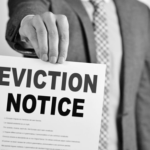You may recall an article I penned last summer about how to evict an unwanted guest without a lease. With college starting for another academic year, leases are being signed in abundance. Consider this a crash course in evictions. As always, if you need the assistance of an attorney to get this done, my contact information is below.
The Lease
A lease agreement is any contract where one person (the Landlord) gives another person (the Tenant) temporary possession and use of real property. In exchange, the Tenant agrees to return possession of the property to the Landlord in the future. In simpler terms, the Landlord rents a dwelling to the Tenant for a specific period of time — e.g., one day, one week, one month.
An extremely basic lease needs only one term: The length the Tenant will be in possession of the property. Additional common lease provisions are:
- The amount of rent per month.
- The amount of a security deposit in case of damages.
- Who is responsible to pay which utilities.
- Obligations of the Landlord.
- Obligations of the Tenant.
- What actions by the Tenant could result in eviction.
There are many more provisions that can be added to a standard lease. By statute, North Dakota includes rules for:
- When the Landlord can change the terms of the lease.
- When the Landlord can legally enter the dwelling.
- When the Landlord must return the security deposit.
- Maintenance of the dwelling by the Landlord.
- Good care of the dwelling by the Tenant.
- When the Tenant may vacate the dwelling.
- How long the Landlord must hold on to the Tenant’s property after the Tenant vacates.
The Breach
A breach of contract is the “nonperformance of a contractual duty when it is due.” To prove breach of contract, a contract must exist, one party must fail to perform one of the terms of the contract, and the injured party must suffer damages. For evictions, the lease is the contract. The lease spells out obligations owed by the Landlord and the Tenant to each other. If either the Landlord or the Tenant fails to perform one of these obligations, that’s a breach.
If the Tenant fails to pay rent, the Landlord suffers damages in lost rental income. If the Landlord fails to maintain the premises, the Tenant suffers damages in costs to make repairs.
If the Tenant breaches the lease, the Landlord can try to evict the Tenant. A breach by the Tenant depends on the terms of the lease, but most commonly include nonpayment of rent, damage to the dwelling, loud parties that disturb the quiet enjoyment of other tenants, and illegal activities.
The Eviction
North Dakota spells out its eviction process in chapter 47-32 of the Century Code. Prior to eviction, the Landlord must post a notice (“notice to quit”) that the Tenant will be evicted. This notice can provide the Tenant as little as three days before the Landlord proceeds with eviction in court. A three-day notice to quit may be posted after the Tenant fails to pay rent or the Tenant breaches a term of the lease. It can also be posted if the Tenant continues to occupy the dwelling after the property is sold to another.
After the notice to quit is posted, one of two things will happen. (1) The Tenant will move out. If so, the lease is terminated. (2) The Tenant doesn’t move out. Now the Landlord must issue a summons and complaint to the Tenant notifying the Tenant that the Landlord is seeking a court order for eviction. The eviction hearing must be held no later than 15 days after the summons is served on the Tenant. Once the court issues an order for eviction, the Landlord can use that order to have the Tenant forcibly removed and rent the dwelling to a new Tenant who will abide by the terms of the lease.
I am one of the real estate attorneys at SW&L and head up our evictions department. If you are a Landlord and have questions on how to evict a Tenant or have questions about lease agreements, call our Real Estate Team at 701-297-2890 or send an email below.
The information contained in this article and on this website is for informational purposes only and not for the purposes of providing legal advice. You should contact an attorney to obtain advice with respect to any particular issue or problem.








